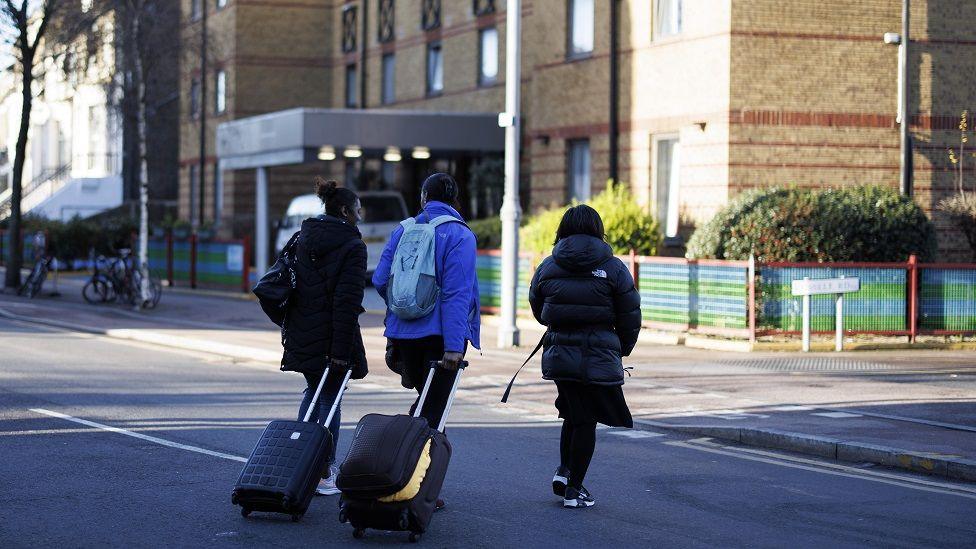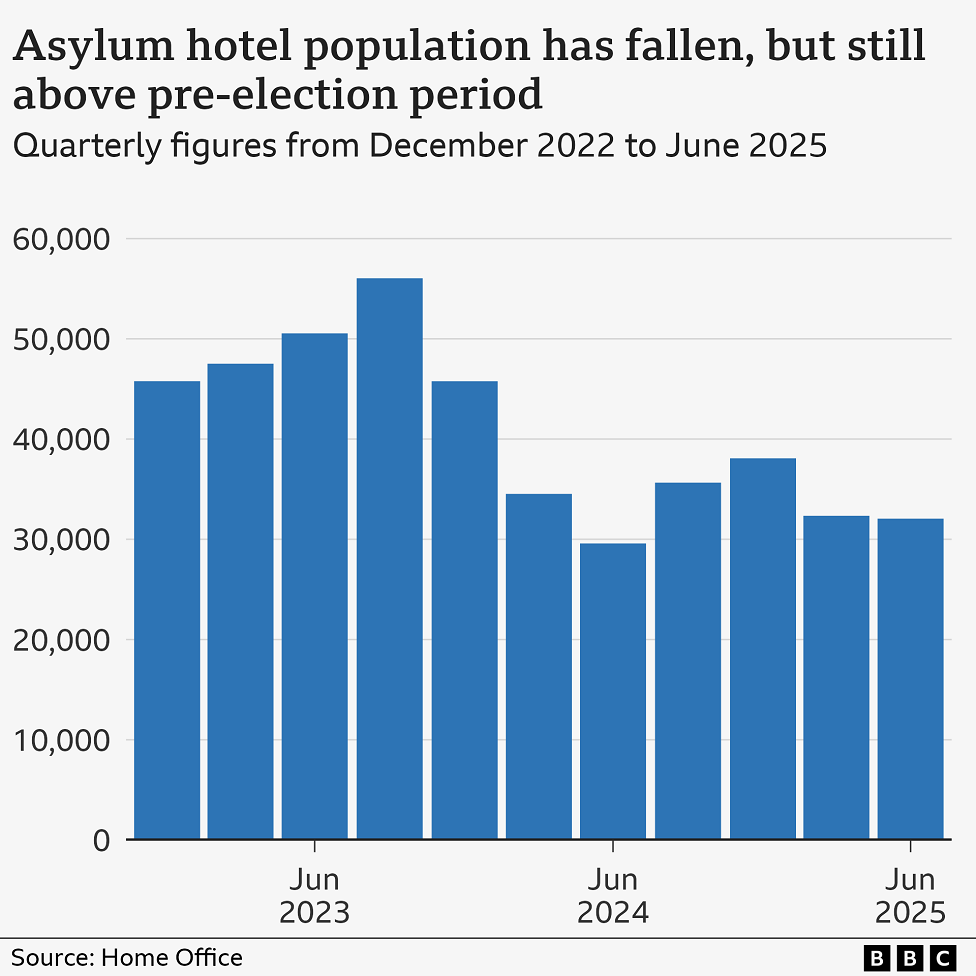Most areas with asylum seeker hotels have Labour councils

- Published
More than half of the council areas with asylum seeker hotels are fully or partly controlled by Labour, according to BBC analysis of figures released by the government.
On Tuesday, Conservative-controlled Epping Forest District Council won a temporary injunction in the courts to stop 140 asylum seekers living at the Bell Hotel in Epping.
The ruling could hinder the government's efforts to fulfil its legal duty of housing asylum seekers, with several Tory councils saying they are also considering legal action.
Two Labour councils are thinking of following suit but others have ruled it out, with two, Newcastle and Brighton and Hove, saying they wanted to provide "sanctuary" to refugees.
Record 111,000 UK asylum applications in past year, figures show
- Published21 August
Migration: How many people come to work and study in the UK?
- Published2 September
Do asylum figures show if government's strategy is working?
- Published21 August
Labour runs many more councils than any other party, so it's not surprising more hotels are in their council areas than those of other parties.
But that may help the government regarding legal actions – with Labour-run councils perhaps not wanting to outrightly challenge their own government's policy.
Reform UK and the Conservative Party have, however, encouraged their councils to take legal action.
According to data published by the Home Office, external on Thursday, 131 of the UK's over 300 local authorities currently house asylum seekers in so-called contingency accommodation, primarily made up of hotels.
Of the 131 areas, 74 are fully or partially led by Labour, 30 by the Liberal Democrats, 19 by the Conservatives, nine by the Green Party and one by Reform UK.
The area with the highest number of asylum seekers living in contingency accommodation is Tory-controlled Hillingdon where 2,238 asylum seekers are housed - around 0.7% of the more than 300,000 people living in the North London borough.
The number represents a fall of 443 in the months from the end of March to the end of June.

Hillingdon is considering taking legal action following the Epping ruling - along with two other Conservative-controlled areas: Broxbourne, Reigate and Banstead.
Of the Labour-controlled areas on the list, Hounslow has the highest number, standing at 1,536 asylum seekers.
Following Hillingdon and Hounslow, the areas with the largest levels are:
Barnet (Labour) - 1,243
Birmingham (Labour) - 1,226
Manchester (Labour) - 1,158
Newham (Labour) - 852
City of Bristol (Green and Lib Dem) - 802
Brent (Labour) - 755
Bournemouth, Christchurch and Poole (Lib Dem and Ind) - 615
Croydon (Conservative) - 577
Manchester City Council saw the biggest jump in numbers, going from 874 to 1,158.
The councils on the full list are mostly lower-tier district or borough councils, or unitary councils which combine the functions of district and county councils into one.
These councils have powers over planning applications, meaning they could chose to follow in Epping Council's footsteps and take legal action against hotels being used to house asylum seekers.
County councils, which are mainly under Reform UK or Conservative control, do not have these powers.
Reform UK leader Nigel Farage has said all 12 councils controlled by his party will "do everything in their power to follow Epping's lead".
However, Reform spokesman Zia Yusuf conceded that only "a minority" of those councils have planning control.
The one Reform UK-led council which would be able to take legal action over planning is West Northamptonshire Council, which has said it is considering the implications of the Epping judgement.
Two Labour councils have suggested they could make legal challenges following the Epping decision.
Carol Dean, leader of Labour-controlled Tamworth Council, said her authority had previously decided against legal action but was now "carefully assessing" what the decision might mean for the area, adding it was a "potentially important legal precedent".
A spokesperson for Wirral Council, which has seen protests outside a hotel in Hoylake, said "legal advice is being taken" and the authority is "considering the detail" of Tuesday's judgment.
Overall, the number of asylum seekers in UK hotels has risen to 32,059 up by 8% in the past year, according to Home Office figures released on Thursday.
Although higher than a year ago, the total is slightly down on the previous quarter - and well down on the peak of 56,042 in September 2023.
Home Secretary Yvette Cooper said the Labour government had "inherited a broken immigration and asylum system that the previous government left in chaos".
She added: "The action we have taken in the last 12 months - increasing returns of failed asylum seekers by over 30%, cutting asylum costs by 11%, reducing the backlog by 18% and our forthcoming plans to overhaul the failing asylum appeal system - are crucial steps to restoring order."
Conservative shadow home secretary Chris Philp has written to Cooper urging her to use former military sites or barges to be used as asylum accommodation instead of hotels or flat shares.
Liberal Democrat home affairs spokesperson Lisa Smart said: "The Conservatives trashed our immigration system and let numbers spiral. Now this Labour government is failing to get a grip on the crisis.
"The government urgently needs to stop dangerous Channel crossings and speed up asylum processing to bring down the backlog and end hotel use once and for all."